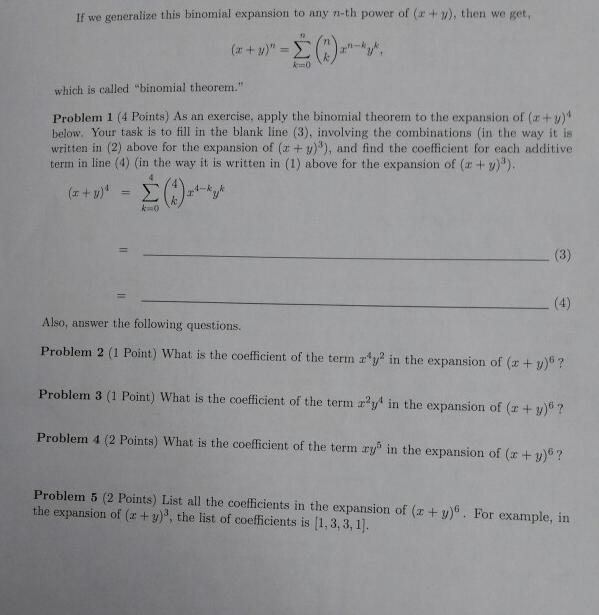Answered step by step
Verified Expert Solution
Question
1 Approved Answer
If we generalize this binomial expansion to any n-th power of (r+y), then we get, -(1)-. (a+y) => which is called binomial theorem. Problem

If we generalize this binomial expansion to any n-th power of (r+y), then we get, -(1)-. (a+y)" => which is called "binomial theorem." Problem 1 (4 Points) As an exercise, apply the binomial theorem to the expansion of (x+y) below. Your task is to fill in the blank line (3), involving the combinations (in the way it is written in (2) above for the expansion of (x + y)), and find the coefficient for each additive term in line (4) (in the way it is written in (1) above for the expansion of (x + y)). (x+y) 4 k=0) (3) Also, answer the following questions. Problem 2 (1 Point) What is the coefficient of the term zy2 in the expansion of (x + y) ? Problem 3 (1 Point) What is the coefficient of the term ry in the expansion of (x + y)? Problem 4 (2 Points) What is the coefficient of the term ry in the expansion of (x + y)? Problem 5 (2 Points) List all the coefficients in the expansion of (x + y). For example, in the expansion of (x+y), the list of coefficients is [1, 3, 3, 1].
Step by Step Solution
★★★★★
3.49 Rating (156 Votes )
There are 3 Steps involved in it
Step: 1

Get Instant Access to Expert-Tailored Solutions
See step-by-step solutions with expert insights and AI powered tools for academic success
Step: 2

Step: 3

Ace Your Homework with AI
Get the answers you need in no time with our AI-driven, step-by-step assistance
Get Started


